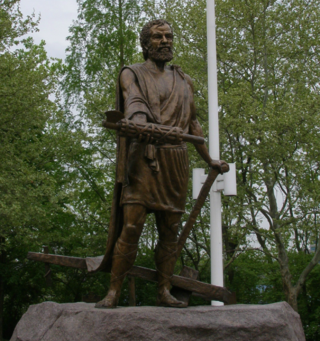
Lucius Quinctius Cincinnatus was a Roman patrician, statesman, and military leader of the early Roman Republic who became a famous model of Roman virtue—particularly civic virtue—by the time of the late Republic.

The gens Manlia was one of the oldest and noblest patrician houses at Rome, from the earliest days of the Republic until imperial times. The first of the gens to obtain the consulship was Gnaeus Manlius Cincinnatus, consul in 480 BC, and for nearly five centuries its members frequently held the most important magistracies. Many of them were distinguished statesmen and generals, and a number of prominent individuals under the Empire claimed the illustrious Manlii among their ancestors.

Titus Quinctius Flamininus was a Roman politician and general instrumental in the Roman conquest of Greece.

Lucius Minucius Esquilinus Augurinus was a Roman politician who was consul in 458 BC and decemvir in 450 BC.

The gens Cornelia was one of the greatest patrician houses at ancient Rome. For more than seven hundred years, from the early decades of the Republic to the third century AD, the Cornelii produced more eminent statesmen and generals than any other gens. At least seventy-five consuls under the Republic were members of this family, beginning with Servius Cornelius Maluginensis in 485 BC. Together with the Aemilii, Claudii, Fabii, Manlii, and Valerii, the Cornelii were almost certainly numbered among the gentes maiores, the most important and powerful families of Rome, who for centuries dominated the Republican magistracies. All of the major branches of the Cornelian gens were patrician, but there were also plebeian Cornelii, at least some of whom were descended from freedmen.

The gens Quinctilia, also written Quintilia, was a patrician family at ancient Rome, dating from the earliest period of Roman history, and continuing well into imperial times. Despite its great antiquity, the gens never attained much historical importance. The only member who obtained the consulship under the Republic was Sextus Quinctilius in 453 BC. The gens produced numerous praetors and other magistrates, but did not obtain the consulship again for over four hundred years.
Caeso Quinctius L. f. L. n. Cincinnatus was a son of the Roman dictator Lucius Quinctius Cincinnatus. His trial for obstructing the tribunes of the plebs in 461 BC was one of the key events in the Conflict of the Orders in the years leading up to the decemvirate.

The gens Lucretia was a prominent family of the Roman Republic. Originally patrician, the gens later included a number of plebeian families. The Lucretii were one of the most ancient gentes, and the second wife of Numa Pompilius, the second King of Rome, was named Lucretia. The first of the Lucretii to obtain the consulship was Spurius Lucretius Tricipitinus in 509 BC, the first year of the Republic.
Titus Quinctius Capitolinus Barbatus was a Roman statesman and general who served as consul six times. Titus Quinctius was a member of the gens Quinctia, one of the oldest patrician families in Rome.
Gaius Julius Iullus was a Roman statesman and member of the ancient patrician gens Julia. He was consular tribune in 408 and 405 BC, and censor in 393.
Servius Cornelius Maluginensis was a politician and general of the Roman Republic. He was elected consular tribune seven times in 386, 384, 382, 380, 376, 370, and 368 BC. Despite having one of the most successful careers of the Republic, Servius' life is little known.
Agrippa Menenius Lanatus was consul of the Roman Republic in 439 BC and possibly the consular tribune of 419 and 417 BC.
Lucius Quinctius Cincinnatus was a consular tribune of the Roman republic in 438, 425, 420 BC and possibly consul in 428 BC.
Titus Quinctius PoenusCincinnatus was a consul of the Roman Republic in 431 and 428 BC and a consular tribune in 426 BC. He might have been consular tribune again in 420 BC.
Aulus Sempronius Atratinus was a consular tribune of the Roman Republic in 425, 420, 416 BC and possibly consul in 428 BC.
Titus Quinctius Capitolinus Barbatus was a consul of the Roman Republic in 421 BC.
Quintus Quinctius Cincinnatus was a consular tribune in 415 and 405 BC of the Roman Republic.
Manius Aemilius Mamercinus was a three-time consular tribune, in 405, 403 and 401 and also consul in 410 BC, of the Roman Republic.
Aulus Manlius Vulso Capitolinus was a consular tribune of the Roman Republic in 405, 402 and 397 BC.
Quintus Servilius Fidenas was a prominent early Roman politician who achieved the position of Consular tribune six times throughout a sixteen-year period. Quintus Servilius was a member of the illustrious gens Servilia, a patrician family which had achieved great prominence since the foundation of the republic. In particular, Servilius was the son of Quintus Servilius Priscus Fidenas, a well respected statesman and general who served as dictator twice, in 435 and 418 BC, as well as holding the religious title of either augur or pontifex, which he held until his death in 390 BC. Servilius the younger himself had at least one son, also named Quintus Servilius Fidenas, who served as consular tribune in 382, 378, and 369 BC.







